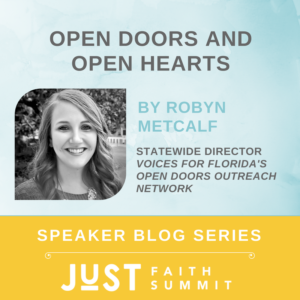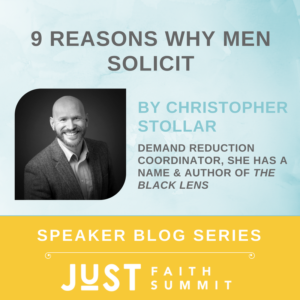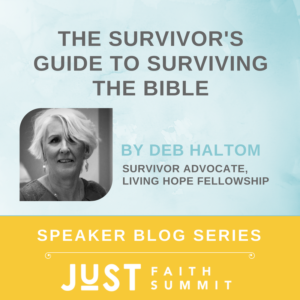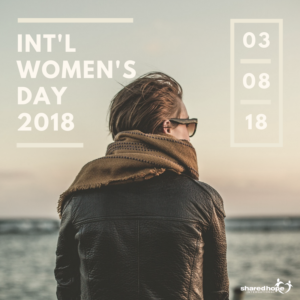Pairing Faith-Based and Private Agencies for Hope and Healing
**This is the fourth guest blog in a series of posts by the 2018 JuST Faith Summit speakers. Check back for new posts highlighting the critical topics that will be featured at this year’s Faith Summit. Join us, June 20-22 at Bethel University in St. Paul, Minnesota, for this exciting Summit. Visit this link to see the full agenda and lineup of speakers.
By Robyn Metcalf, Statewide Director, Voices for Florida’s Open Doors Outreach Network
One of my favorite quotes is by Albert Einstein – “The definition of insanity is doing the same thing over and over and expecting different results.”
That’s why I was drawn to working for Voices for Florida and absolutely love coming to work each day. Voices for Florida specializes in bringing people together to apply innovation and out of the box thinking to solve complex social problems – including improving Florida’s response to sex trafficking.
Einstein’s quote also accurately depicts the “why” behind our most recent innovation, the Open Doors Outreach Network, a public-private partnership to improve care, coordination and collective impact for commercially sexually exploited (CSE) children and young adults in Florida.
Florida ranks 3rd in the country for the prevalence of human trafficking. In 2016, 356 child victims of commercial sexual exploitation (CSE) were verified in Florida, representing an increase of 54% from the prior year. It is expected that this number is very low in representing the true magnitude of this complex problem. Throughout Florida, large gaps exist within restorative services, cross-sector collaboration, professional training and trauma-focused crisis intervention that meet the complex needs of sexually exploited and trafficked victims.
In recent years, state agencies, thought leaders, and direct service providers throughout Florida have all acknowledged that to provide high quality services to CSE victims in a diverse, heavily populated state, an all-hands-on-deck approach from a variety of stakeholders and sectors would be required. Government alone cannot solve this complex social problem.
Voices for Florida has answered this call for a new, coordinated systems approach by developing and rolling out a pilot called the Open Doors Outreach Network.
For Open Doors, Voices serves as the backbone organization by guiding vision and strategy, supporting aligned activities, establishing shared measurement practices, and advancing policy, training and funding. We partner with direct service providers throughout the state to deliver immediate and on-going victim-centered, survivor-led services 24/7/365.
How does the Open Doors Outreach Network care for victims?
Upon identification, a highly trained professional team, referred to as the Open Doors Outreach Team consisting of Survivor-Mentors, Regional Advocates and Clinicians work together to offer quality immediate and ongoing services to each exploited and trafficked victim. Each team member serves a unique role in meeting the distinct needs of everyone served. Our treatment model uses a survivor-led lens that is also community-based and trauma-informed. Members of the Outreach Team are on-call 24/7 and available to assist victims upon identification and referral to the Open Doors Outreach Network.
Being survivors of sexual exploitation themselves, Survivor-Mentors have similar lived experience to the population being served. As such, they can better identify their needs and build a trusting relationship through shared experiences. Regional Advocates are well-connected advocates and experts on the available services throughout their region. They work closely with Survivor-Mentors to ensure the individuals being served receive appropriate referrals to meet their needs. Clinician provides important individual, family, and group counseling that can help all involved process the grief and trauma that has been experienced due to the victimization.
Why is it important for faith-based and private agencies to partner on the Open Doors Outreach Network?
Our philosophy is we’re better together. That’s why one of the many partners that we work with is Florida Baptist Children’s Home, also knows as, One More Child. We believe bringing the faith-based community to the table is critical to achieving true collective impact for improving victims’ lives. Faith-based organizations have an important voice and unique access to resources needed to fully build strong community safety nets of support for victims on their journey to survivorship. In meeting the needs of this population, everyone can and should be involved.
[easy-tweet tweet=”We believe bringing the faith-based community to the table is critical to achieving true collective impact for improving victims’ lives.” user=”SharedHope” hashtags=”FaithSummit2018″]
So, what can you do?
- Become informed and learn to recognize the signs of sex trafficking. If you see something – say something and make a report! To become more informed about Voices for Florida and the Open Doors Outreach Network, follow us on Facebook @VoicesForFL and visit our website, voicesforflorida.org to sign up to receive our monthly updates.
- Think outside the box! Voices for Florida Open Doors Outreach Network seeks to address sex trafficking by connecting organizations that have never worked together before. This creates collaboration and community in an innovative way that has paved the way for real solutions.
- Attend our session at the Faith Summit and learn how vital it can be for faith-based organizations to partner with public and private organizations to provide solutions to some of our most complex issues, including sex trafficking.
[easy-tweet tweet=”What can you do? 1) Learn to recognize the signs of trafficking, 2) Think outside the box! 3)Attend out session at the Faith Summit and learn more about our model.” user=”SharedHope” hashtags=”FaithSummit2018″]
 By Robyn Metcalf, Statewide Director, Voices for Florida’s Open Doors Outreach Network
By Robyn Metcalf, Statewide Director, Voices for Florida’s Open Doors Outreach Network
 By Christopher Stollar
By Christopher Stollar
 No doubt this year’s national discussion will involve the courageous movement of women standing up and speaking out against sexual assault. In today’s #MeToo culture, women are breaking the silence of injustice and making clear that their bodies are their own. We can all agree that it’s past time that abusers are held accountable for their actions and face consequences, but even with this powerful movement underway, we’re leaving behind a tremendous population of women. When we talk about breaking the silence about abuse, we’re still ignoring the issue of sex trafficking.
No doubt this year’s national discussion will involve the courageous movement of women standing up and speaking out against sexual assault. In today’s #MeToo culture, women are breaking the silence of injustice and making clear that their bodies are their own. We can all agree that it’s past time that abusers are held accountable for their actions and face consequences, but even with this powerful movement underway, we’re leaving behind a tremendous population of women. When we talk about breaking the silence about abuse, we’re still ignoring the issue of sex trafficking.





